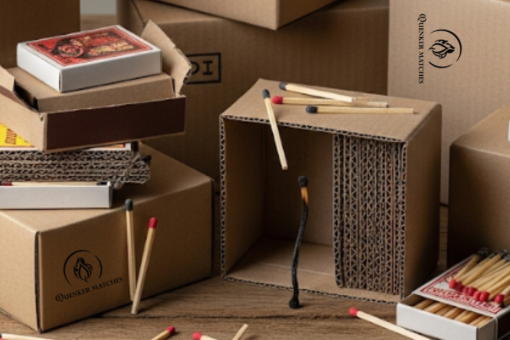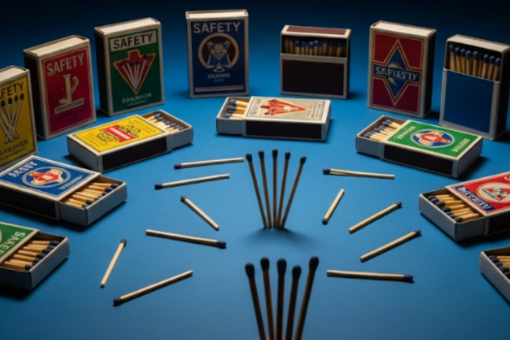
Why Cardboard Is the Ideal Packaging Material for Safety Matches
Introduction
Safety matches are everyday essentials found in homes, restaurants, and businesses worldwide. Whether lighting a stove, candle, or campfire, these small sticks make starting a flame easy. However, the packaging that holds these matches is just as important as the matches themselves. Proper packaging keeps matches safe, fresh, and easy to use.
Among various packaging materials, cardboard stands out as the best choice for packing safety matches. In this blog, we’ll explain why cardboard is the ideal packaging material by discussing how it protects matches, enhances safety, is cost-effective, supports the environment, and improves branding and user experience.
What Are Safety Matches and Why Packaging Matters
Safety matches are small sticks made from wood or cardboard, with a chemical-coated tip that ignites when struck against a specific rough surface.
Because matches are flammable, their packaging plays several vital roles:
Protect matches from breaking or damage during transport
Reduce the risk of accidental ignition
Keep matches dry and ready to use
Provide convenience to users for carrying and striking matches
Display branding and safety instructions clearly
Cardboard meets all these needs effectively, making it the ideal packaging material.
Benefits of Cardboard in the Safety Match Industry
Cardboard packaging is strong and sturdy enough to protect fragile matches inside. Matches can easily break or bend if packed in weak materials like thin paper or plastic. The thickness and rigid structure of cardboard keep matches safe from crushing and physical damage during shipping and handling.
Besides physical protection, cardboard helps shield matches from dirt, dust, and moisture. Humidity is a major enemy for matches since wet match heads won’t light properly. Cardboard boxes can be treated with moisture-resistant coatings, ensuring matches stay dry and reliable even in damp environments.
1. Cardboard: The Safer Packaging Material
Safety is a priority when packaging flammable products like matches. Cardboard has several safety advantages over materials like plastic or metal:
It does not build up static electricity or sparks, which lowers fire risk.
Cardboard matchboxes often include a built-in striking surface made from rough material for safe ignition.
Compared to slippery plastic packaging, cardboard offers a better grip and safer handling.
It can be treated with fire-retardant chemicals for extra safety.
These qualities make cardboard packaging a safer choice for both manufacturers and consumers.
2. Cost-Effective and Easy to Source
Cost plays a big role in packaging choices, and cardboard is a smart option for many reasons:
It is inexpensive to produce and easy to manufacture.
Cardboard can be cut, folded, and shaped into boxes of various sizes and designs without much added cost.
Using cardboard helps manufacturers keep prices affordable for consumers.
This balance between cost and quality makes cardboard packaging very popular for safety matches.
3. Environmental Benefits of Cardboard Packaging
With growing awareness about environmental protection, choosing sustainable packaging is important. Cardboard is a highly eco-friendly choice:
Made from natural wood pulp, it is biodegradable and breaks down safely in the environment.
It is widely recyclable, and many cardboard boxes are produced from recycled materials.
Choosing cardboard over plastic helps reduce landfill waste and pollution.
Companies using cardboard packaging appeal to environmentally conscious customers.
4. Attractive and Functional Packaging Design
Packaging plays a big role in marketing. Cardboard is easy to print on and customize, helping products stand out:
High-quality printing supports logos, product details, and safety instructions.
It can be coated with matte or glossy finishes for a premium look.
Cardboards can be folded into custom shapes and sizes to attract customers.
It allows embossing and other special effects to create unique packaging.
By combining protection and design, cardboard packaging helps brands connect with customers effectively.
5. Convenience and Ease of Use for Consumers
Consumers appreciate packaging that is easy to open, close, and carry. Cardboard matchboxes are lightweight and designed for convenience.
Most cardboard matchboxes include a built-in striking surface, so users don’t need extra materials. The boxes are small and fit easily in pockets, bags, or kitchen drawers.
Because cardboard is easy to stack and store, retailers and customers find it practical to keep matches organized and accessible.
6. Ideal for Manufacturers and Exporters
From a business viewpoint, cardboard packaging benefits safety matches exporters and manufacturers by:
Being easy to mass-produce and customize
Lowering shipping costs due to its lightweight nature
Providing sturdy protection that reduces product damage during transport
Meeting export and safety standards in various countries
This combination supports efficient supply chains and happy customers.
7. Customization Options for Brand Differentiation
One major benefit of cardboard packaging is how easily it can be customized to help brands stand out. In a crowded market, unique packaging designs make a big difference in attracting customers. Cardboard allows brands to combine creativity with functionality in several ways:
Vibrant printing: Cardboard surfaces support high-quality, colorful printing that showcases logos, product images, and brand colors clearly.
Special finishes: Brands can choose gloss, matte, embossing, or foil stamping to create a premium look and feel.
Custom shapes and sizes: Cardboard can be cut and folded into unique box shapes, with options like windows to display matches inside.
User-friendly features: Easy-open tabs, integrated striking surfaces, and secure closures improve customer experience.
Clear safety instructions: Important usage and safety guidelines can be printed directly on the packaging, increasing user confidence.
This combination of design and practicality not only protects the matches but also strengthens brand identity and customer loyalty.
How Cardboard Compares to Other Packaging Materials
Here is a quick comparison of cardboard against other materials commonly used for match packaging:
Material
Advantages
Disadvantages
Cardboard
Affordable, sturdy, recyclable, printable
Can weaken if exposed to moisture without treatment
Plastic
Waterproof, durable
Expensive, not eco-friendly, risk of static sparks
Metal
Very strong, fire-resistant
Heavy, costly, less recyclable
Paper
Cheap, lightweight
Weak, tears easily, poor protection
Tips for Choosing the Best Cardboard Packaging for Matches
If you are a safety matches manufacturer or exporter, consider these tips to choose the best packaging:
Use moisture-resistant coatings to protect matches from humidity.
Include a high-quality striking surface for easy ignition.
Design the box for easy opening and secure closing.
Print clear safety instructions and branding information.
Choose appropriate cardboard thickness to match shipping and storage needs.
Following these guidelines will ensure your matches reach customers safely and look professional.
The Future of Safety Match Packaging: Trends in Cardboard Use
Cardboard packaging is set to remain the top choice for safety matches as new trends focus on sustainability, innovation, and consumer engagement. Here are some key developments shaping the future:
✅ Eco-friendly materials: Increased use of biodegradable and recyclable cardboard meets rising consumer demand for green packaging.
✅ Advanced coatings: Moisture-resistant and fire-retardant treatments enhance durability and safety without relying on plastics.
✅ Minimalist designs: Brands are moving toward thinner, lighter cardboard packaging that uses fewer materials but maintains strength.
✅ Digital integration: Printing QR codes and interactive elements on cardboard boxes connects consumers to videos, instructions, and promotions.
✅ Reusable packaging concepts: Some companies explore packaging that can be reused or repurposed, reducing waste further.
Conclusion
In summary, cardboard packaging is the ideal solution for safety matches because it provides strong physical protection, keeps matches dry, reduces fire risks, and is cost-effective. For manufacturers, suppliers, and exporters who want top-quality safety matches with reliable packaging, Quenker Matches is the best choice.
Need premium safety matches with custom packaging? Contact Us now!
Quenker matches produce premium safety matches packed in sturdy, moisture-resistant cardboard boxes that meet international safety standards. Choosing Quenker means getting matches that are safe, durable, eco-friendly, and convenient for users. Their packaging not only protects the product during transport but also enhances brand visibility and customer satisfaction.









